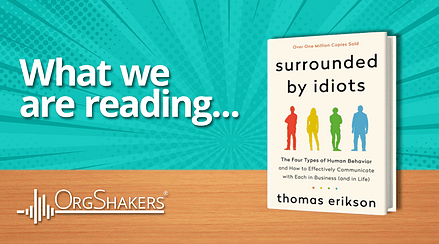Menu

All the World’s a Stage: So, what’s YOUR workplace persona?
In Shakespeare’s As You Like It, the character Jaques famously declares, “All the world’s a stage, and all the men and women merely players”. In other words, all of us are, to some extent, putting on an act when interacting with the world around us.
This is particularly resonant in the modern workplace, where employees often feel the need to adopt a professional persona that aligns with company culture, industry expectations, and leadership styles. But to what extent is this workplace persona necessary? And how does it impact employee wellbeing, performance, and authenticity?
A workplace persona – a cultivated version of oneself tailored to professional settings – serves various purposes. It can help with maintaining professional boundaries, navigating workplace dynamic, and even building credibility for someone’s own personal brand. Whatever the reason, it has always been well-known that the workplace has a set of pseudo-expectations that many of us will adhere to because there is a certain ‘way’ to be an employee. And the numbers speak for themselves when it comes to this phenomenon: a survey by Workhuman found that 73% employees claimed to have a ‘work personality’ that was different to how they interacted with family or friends.
While professionalism is undeniably important for employers, the pressure on employees to sustain a rigid workplace persona can be exhausting and, in some cases, detrimental to mental health. Employees who feel compelled to mask their true selves for extended periods may experience emotional fatigue, reduced job satisfaction, and even burnout. This phenomenon, known as ‘surface acting,’ occurs when individuals suppress their genuine emotions in favor of expected workplace behaviour, which can inadvertently lead to creativity and innovation being stifled.
The key for both employees and employers is to strike a balance between professionalism and authenticity. Encouraging a psychologically safe environment where employees feel comfortable expressing themselves without fear of judgment can improve morale and ensure that creativity and innovation – two things that require the courage to take risks – remain a top priority in your business.
Flexibility in workplace norms, such as hybrid work models or relaxed dress codes, can also contribute to a more authentic and comfortable environment. When employees feel supported in being themselves (while still maintaining professional standards) they are more likely to remain engaged and committed to their roles.
The world of work is indeed a stage, but employees shouldn’t feel like actors reading from a script. While a workplace persona can facilitate professionalism and collaboration, it should not come at the cost of authenticity and wellbeing. Organizations that recognize and respect the balance between professional expectations and individual identity will ultimately foster a healthier, more productive workforce.
If you would like to discuss how we can help your organization strike the perfect balance between professionalism and individualism, please get in touch with us today!



